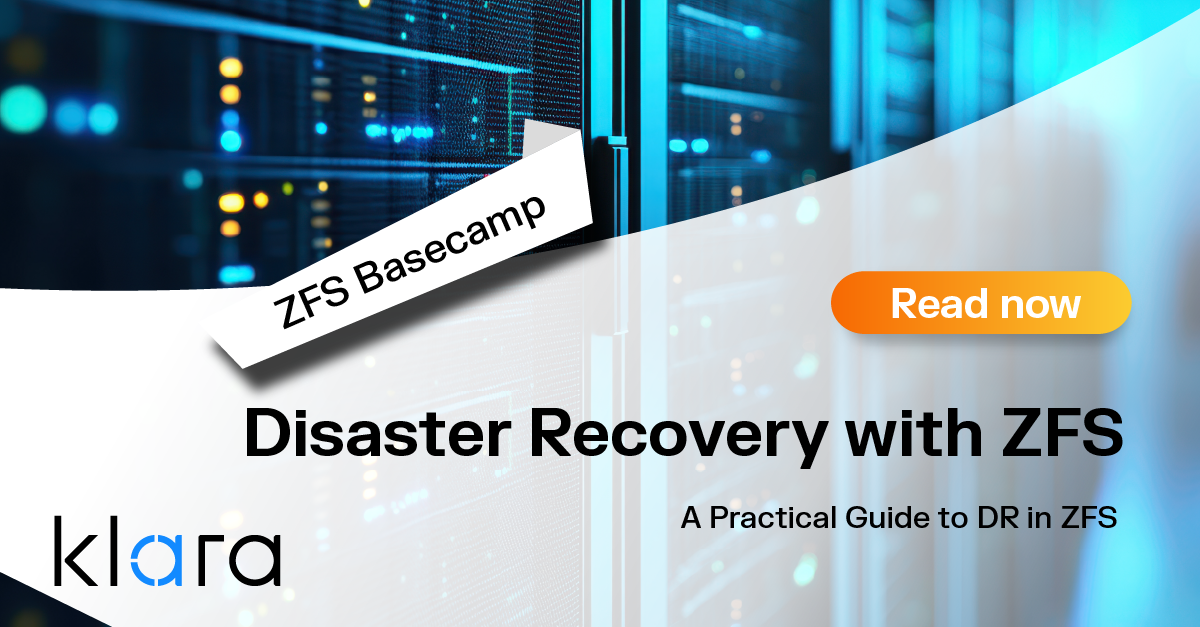Improve the way you make use of ZFS in your company.
Did you know you can rely on Klara engineers for anything from a ZFS performance audit to developing new ZFS features to ultimately deploying an entire storage system on ZFS?
ZFS Support ZFS DevelopmentAdditional Articles
Here are more interesting articles on ZFS that you may find useful:
- ZFS in Virtualization: Storage Backend for the Pros
- Disaster Recovery with ZFS: A Practical Guide
- ZFS Performance Tuning – Optimizing for your Workload
- Reliable ZFS Storage on Commodity Hardware – A Cost-Efficient, Data-Sure Storage Solution
- Owning the Stack: Infrastructure Independence with FreeBSD and ZFS
As commercial storage becomes increasingly expensive, more and more of the Education vertical is looking at Open Source solutions for storage. This article series will focus on providing a better understanding of why OpenZFS is a cost-optimal, future-workload ready solution for Schools and Universities and will take a deeper dive into the demands of HPC (High Performance Computing) and how to best leverage OpenZFS in that context.
Let’s Starting at the Beginning – What is OpenZFS
If you’re new to our article series, you might not have been acquainted yet with OpenZFS. Check out our other technical introductory write-ups such as Basics of ZFS Snapshots and Introduction to ZFS Replication to dive deeper into the topic.
OpenZFS is an open source file system and volume manager renowned for its advanced data management and protection features. With its robust capabilities, OpenZFS emerges as an excellent choice for university infrastructures. The unique requirements of educational institutions, such as managing large volumes of data, ensuring data integrity, and facilitating collaboration, align perfectly with the strengths of OpenZFS.
By harnessing its power, commercial users such as universities can optimize their data storage and management, safeguard critical information, promote seamless collaboration, and achieve cost-effective solutions. What we'll do in this article, is explore the reasons why OpenZFS stands out as a compelling candidate for university infrastructures.
The Challenge of Storing Data in University Environments
Universities have diverse storage requirements due to the wide range of activities they engage in. This also means some very unique challenges that regular users might not encounter on a regular basis just because of the dynamic environment.
So what are some of the key use cases and challenges that universities are faced with?
- Research Data: Universities are centers of research, and they generate and store massive volumes of research data. This can include experimental data, scientific simulations, genomic data, training sets, and other data-intensive research outputs.
- Student Information: Most academia, schools and universities are tasked to handle vast amounts of student information, including academic records, enrollment data, grades, and personal details. This data needs to be securely stored and easily accessible for administrative purposes, student services, and compliance with privacy regulations.
- Multimedia Content: Universities often produce and store multimedia content, including lecture recordings, video tutorials, virtual labs, and multimedia presentations. These resources require significant storage space and efficient retrieval mechanisms to support distance learning initiatives and provide educational materials to students.
- Institutional Archives: Universities maintain institutional archives to preserve historical records, publications, manuscripts, and other valuable intellectual property. These archives require long-term storage solutions that ensure data integrity, accessibility, and preservation over extended periods.
- Collaboration and File Sharing: Universities foster collaboration among researchers, faculty, and students. Hence, storage systems must support easy and secure sharing of files and data sets, enabling efficient collaboration, version control, and synchronization across multiple users and locations.
- Data Protection and Disaster Recovery: Universities handle critical and sensitive data, necessitating robust data protection mechanisms. Storage solutions should include features such as data redundancy, snapshotting, backup, and disaster recovery capabilities to minimize the risk of data loss and ensure business continuity.
- Compliance and Security: Universities need to adhere to data protection regulations, privacy laws, and security standards. Storage solutions should provide encryption options, access controls, auditing capabilities, and compliance features to meet these requirements and safeguard sensitive information.
Addressing these storage requirements effectively is crucial for universities to support their academic, research, and administrative activities. OpenZFS provides a comprehensive set of features that align with these needs, making it a suitable choice for university infrastructures. We'll explore this in our next session.
Should Universities Choose Open Source or Commercial Storage Solutions?
The answer is definitely a predictable one: “It depends”. Infrastructure solutions are often a function of budget availability, knowledge, flexibility and just general interest. Knowing how your organization deals with technology will tell you more about which one is the right one for your use case.
While commercial storage solutions may offer certain benefits such as dedicated support and specialized features, the cost-effectiveness, flexibility, transparency, community collaboration, and expertise utilization offered by open source solutions like OpenZFS make them highly suitable storage solutions for universities. These factors align well with the budget constraints and diverse expertise found within university environments, enabling them to optimize their storage infrastructure while focusing on their core academic and research objectives.
Open source solutions like OpenZFS can put the user in the driver’s seat by essentially being a lot more customizable, at a far lower cost. But let’s take a step back and look at all the advantages it provides:
- Cost-Effectiveness: Budget considerations play a significant role in IT decision making at universities, and open source solutions can be more cost-effective than commercial alternatives. OpenZFS, being open source, is free to use and doesn't require costly licensing fees. Importantly, this advantage is linear, the more storage connected to OpenZFS, the more budget is saved on licensing. This allows universities to allocate their limited resources to other critical areas, such as research, teaching, and infrastructure development.
- Flexibility and Customizability: Open source solutions provide the flexibility and freedom to tailor the storage system to specific university requirements. Universities often have unique storage needs due to the diverse range of academic disciplines and research areas they cater to. OpenZFS, as an open source platform, allows for extensive customization and integration with existing infrastructure, making it easier to adapt to evolving storage demands.
- Community and Collaboration: Open source projects foster vibrant communities of developers, contributors, and users. The collaborative nature of these communities ensures continuous improvement, bug fixes, and knowledge sharing. Universities we some of the founding members of the open source movement and can continue to benefit from this active community by accessing support forums, documentation, and engaging with experts who can provide valuable insights and assistance. The collaborative environment promotes innovation and ensures that the storage solution remains up-to-date with the latest technologies and best practices.
- Transparency and Security: Open source solutions provide transparency in terms of their source code, allowing universities to audit and verify the security and integrity of the system. This transparency helps identify and rectify vulnerabilities promptly, ensuring a higher level of security for sensitive university data. Additionally, open source software benefits from the collective efforts of a large community, which enhances its overall security through rigorous testing and peer review.
- Expertise and Knowledge Sharing: Universities often have a pool of skilled IT professionals and researchers who can contribute to and benefit from open source solutions. OpenZFS allows universities to leverage the expertise of their own staff members and encourages knowledge sharing within the institution. This collaborative environment promotes professional growth, fosters a culture of innovation, and empowers universities to actively participate in the development and improvement of the storage solution.
OpenZFS And High Performance Computing (HPC)
Universities rely on HPC primarily for advanced scientific research. HPC allows researchers to conduct groundbreaking studies in fields such as physics, chemistry, biology, astronomy, climate science, and computational mathematics. These disciplines often involve complex simulations, data analysis, and modeling that require significant computational power. HPC enables researchers to tackle large-scale problems, perform intricate calculations, and explore scientific phenomena that would be otherwise impractical or impossible.

Looking at this graph, we can easily see HPC plays a crucial role in driving innovation and technological advancements in every field, however academia has a strong reason to rely on it. It supports the development of new algorithms, data analysis techniques, and simulation methods. Universities can leverage HPC to pioneer new research methodologies, explore interdisciplinary collaborations, and push the boundaries of knowledge in various domains.
So how does OpenZFS play in the HPC market? Let’s go over the advantages a bit.
OpenZFS prioritizes data integrity and reliability by employing advanced checksumming techniques. This ensures the accuracy and consistency of stored data, which is vital for HPC applications that depend on precise data for accurate research outcomes.
OpenZFS efficiently handles large-scale data storage. It supports scalable storage pools, allowing universities to seamlessly expand their storage infrastructure as data volumes increase. Its extensible storage configurations maximize performance and capacity, meeting the demanding requirements of HPC workloads.
The flexibility of OpenZFS is another advantage. It offers features like caching, compression, and deduplication, optimizing storage utilization, improving performance, and reducing costs. Snapshotting and cloning capabilities enable researchers to create reproducible experiments and efficiently manage multiple versions of datasets at a lower cost of storage.
OpenZFS ensures high availability through fault tolerance mechanisms. Software-based RAID (RAID-Z) safeguards data against drive failures, and hot-swapping of drives minimizes downtime during hardware replacements, ensuring uninterrupted cluster operations.
In one of the next articles in this series, we will dive deeper into what it means to deploy OpenZFS for HPC clusters and what some of the technical limitations are.
Conclusions
OpenZFS emerges as the ideal solution for university infrastructures, even in the context of High-Performance Computing (HPC). Its technical prowess and unique features make it well-suited for the complex requirements of university environments.
OpenZFS shines in its ability to customize and optimize storage resources. With features such as transparent compression, adaptive caching, and strong checksumming, it optimizes storage utilization, enhances performance, and reduces costs. The Copy-on-Write nature of ZFS ensures data integrity and efficient data management, both of which are critical for research activities in universities.
In HPC environments, where computational power and reliability are paramount, OpenZFS delivers exceptional performance. Its resilience to failures, thanks to software-based RAID (RAID-Z) and hot-swappable drive support, ensures high availability and minimal downtime during hardware replacements.
Furthermore, OpenZFS's open source nature fosters a vibrant community of developers, administrators, and researchers. This community-driven ecosystem ensures continuous improvement, support, and knowledge sharing. Universities can leverage this community for technical assistance, best practices, and collaboration opportunities, enhancing the storage infrastructure's reliability, efficiency, and longevity.
Considering the budget constraints often faced by universities, OpenZFS emerges as a cost-effective solution. By being open source, it eliminates costly licensing fees associated with commercial alternatives, allowing universities to focus allocation of resources on the storage they need.
Last but not least we want to end with saying that OpenZFS stands as the optimal storage solution for university infrastructures, even in HPC environments. Its technical superiority, customization capabilities, resilience, community support, and cost-effectiveness align perfectly with the diverse needs of universities, empowering them to efficiently manage their data and facilitate cutting-edge research across various academic disciplines.
officeklara
Learn About KlaraGetting expert ZFS advice is as easy as reaching out to us!
At Klara, we have an entire team dedicated to helping you with your ZFS Projects. Whether you’re planning a ZFS project or are in the middle of one and need a bit of extra insight, we are here to help!














